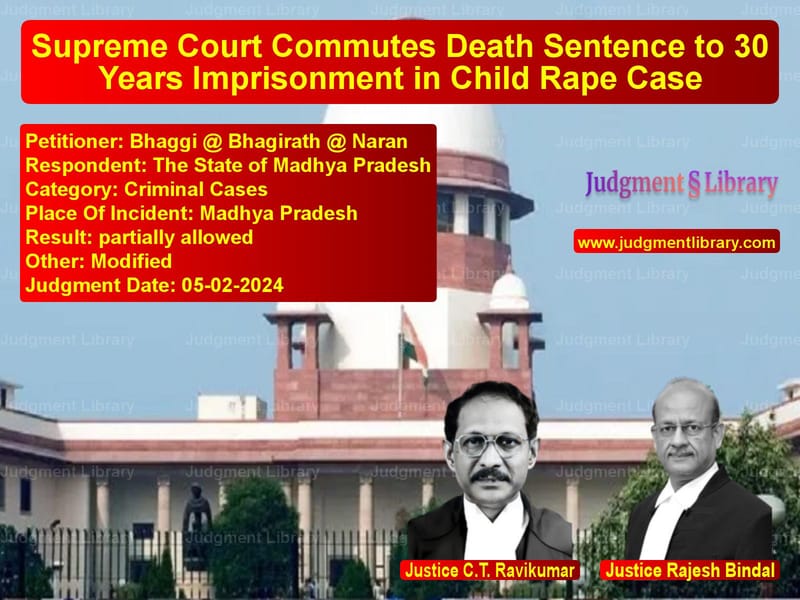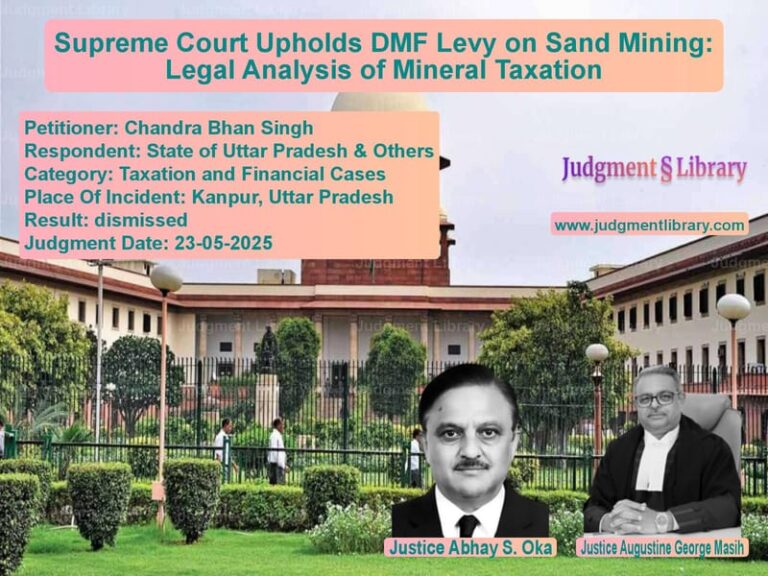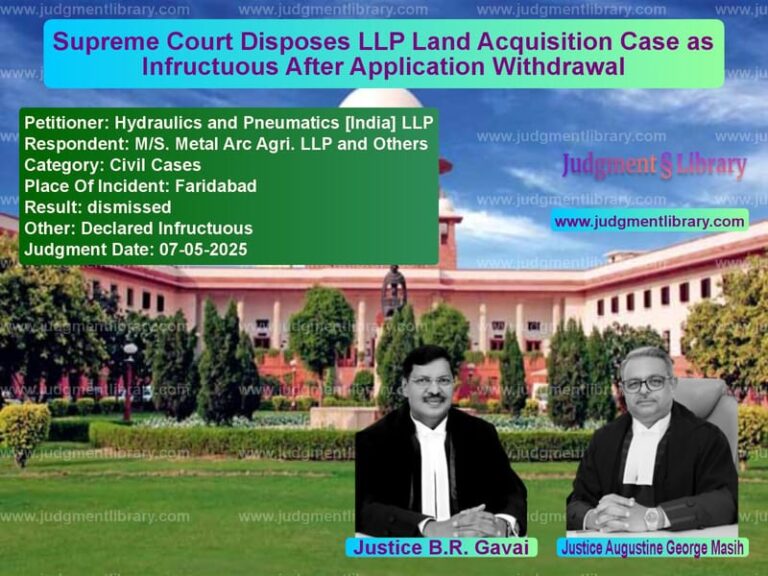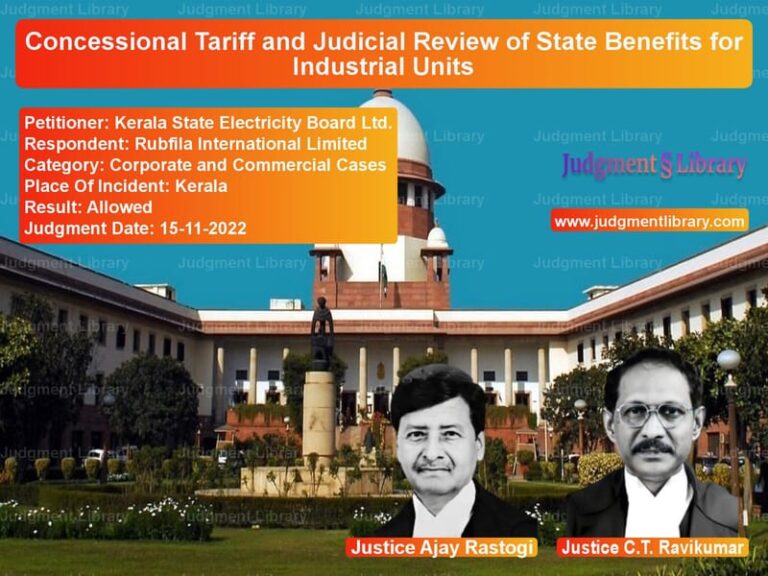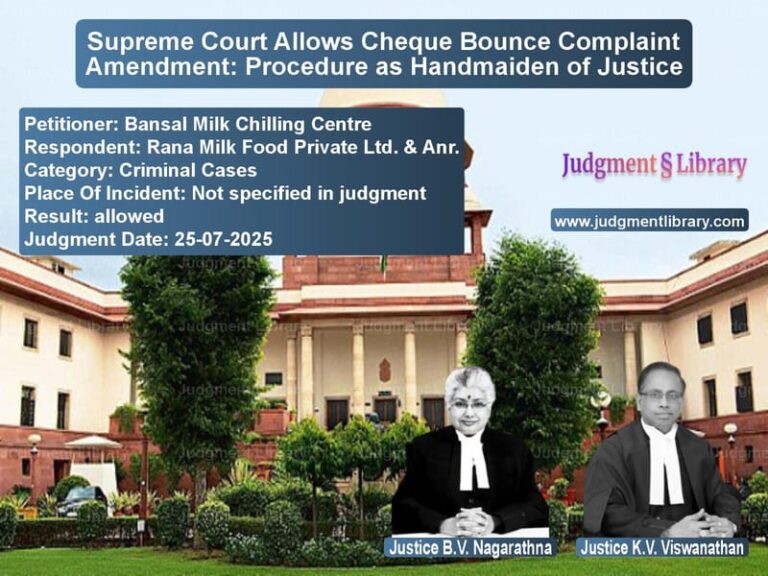Supreme Court Commutes Death Sentence to 30 Years Imprisonment in Child Rape Case
The Supreme Court, in Bhaggi @ Bhagirath @ Naran v. The State of Madhya Pradesh, commuted the death sentence awarded to the appellant for the rape of a 7-year-old girl to rigorous imprisonment for 30 years. The Court held that while the crime was “barbaric,” it did not meet the threshold for the rarest of rare cases warranting the death penalty.
Background of the Case
The appellant, Bhaggi @ Bhagirath @ Naran, was convicted for the rape of a 7-year-old girl under Section 376 AB of the Indian Penal Code (IPC) and provisions of the Protection of Children from Sexual Offences Act, 2012 (POCSO Act). The trial court sentenced him to death, which was later commuted by the High Court of Madhya Pradesh to life imprisonment for the remainder of his natural life. The appellant challenged this before the Supreme Court, seeking a further reduction in the sentence.
Key Legal Issues
- Whether the sentence of life imprisonment for the remainder of the appellant’s natural life should be reduced.
- Whether the crime met the criteria for the rarest of rare cases warranting the death penalty.
- Whether alternative sentencing under Section 376 AB of the IPC was appropriate.
Petitioner’s (Appellant’s) Arguments
- The appellant was 40 years old at the time of the offense and had no prior criminal record.
- The High Court itself had observed that the crime was not committed in a “barbaric and brutal” manner, making the death penalty excessive.
- There was a possibility of rehabilitation and reformation.
- The High Court should have considered the alternative punishment under Section 376 AB IPC—rigorous imprisonment for at least 20 years.
Respondent’s (State of Madhya Pradesh) Arguments
- The High Court had already commuted the death sentence to life imprisonment, and no further reduction was warranted.
- The appellant’s actions were extremely heinous, involving the rape of a minor inside a temple.
- There was no mitigating factor warranting a further reduction in punishment.
Supreme Court’s Observations
The Bench, comprising Justices C.T. Ravikumar and Rajesh Bindal, analyzed the case and made key observations:
- “The act committed by the petitioner-convict is undoubtedly barbaric, but the absence of extreme depravity and brutality distinguishes it from the rarest of rare cases warranting the death penalty.”
- “A fixed-term imprisonment of 30 years will serve as an adequate deterrent while also allowing for the possibility of reformation.”
- “The victim was subjected to extreme trauma, and the heinous nature of the crime cannot be understated.”
- “The petitioner had no prior criminal record, and the possibility of his reformation cannot be entirely ruled out.”
Key Legal Findings
- The Supreme Court upheld the High Court’s commutation of the death penalty.
- The Court modified the sentence to rigorous imprisonment for 30 years, including the period already served.
- A fine of ₹1 lakh was imposed to be paid to the victim for her medical expenses and rehabilitation.
- The Court reiterated that sentencing in such cases should balance deterrence with the possibility of reformation.
Final Judgment
The Supreme Court ruled:
“The petitioner shall undergo rigorous imprisonment for 30 years, including time already served, and shall not be released before completing this sentence. A fine of ₹1 lakh shall be paid to the victim for her rehabilitation.”
Key Takeaways from the Judgment
- The crime was categorized as “barbaric,” but not “brutal” enough to warrant the death penalty.
- Alternative sentencing under Section 376 AB IPC was applied.
- Victims’ rehabilitation is integral to sentencing, as reflected in the ₹1 lakh fine imposed on the appellant.
- Sentencing must be proportionate to the crime while allowing for the possibility of reformation.
Impact of the Judgment
This ruling clarifies the sentencing framework for child rape cases and provides guidelines for commutation of the death penalty in non-homicidal sexual offenses. It ensures:
- Clear distinctions between “barbaric” and “brutal” crimes in capital punishment cases.
- Implementation of alternative sentencing within the IPC framework.
- Recognition of the victim’s rehabilitation needs in sentencing decisions.
- Judicial discretion in sentencing, balancing deterrence with potential reformation.
Conclusion
The Supreme Court’s decision in Bhaggi @ Bhagirath @ Naran v. The State of Madhya Pradesh ensures a balanced approach to sentencing in cases of heinous sexual crimes. While reaffirming the severity of the offense, the Court’s ruling also considers the potential for reformation, making it a significant precedent in criminal jurisprudence.
Petitioner Name: Bhaggi @ Bhagirath @ Naran.Respondent Name: The State of Madhya Pradesh.Judgment By: Justice C.T. Ravikumar, Justice Rajesh Bindal.Place Of Incident: Madhya Pradesh.Judgment Date: 05-02-2024.
Don’t miss out on the full details! Download the complete judgment in PDF format below and gain valuable insights instantly!
Download Judgment: bhaggi-@-bhagirath-@-vs-the-state-of-madhya-supreme-court-of-india-judgment-dated-05-02-2024.pdf
Directly Download Judgment: Directly download this Judgment
See all petitions in Rape Cases
See all petitions in Juvenile Justice
See all petitions in Judgment by C.T. Ravikumar
See all petitions in Judgment by Rajesh Bindal
See all petitions in partially allowed
See all petitions in Modified
See all petitions in supreme court of India judgments February 2024
See all petitions in 2024 judgments
See all posts in Criminal Cases Category
See all allowed petitions in Criminal Cases Category
See all Dismissed petitions in Criminal Cases Category
See all partially allowed petitions in Criminal Cases Category

